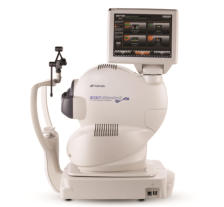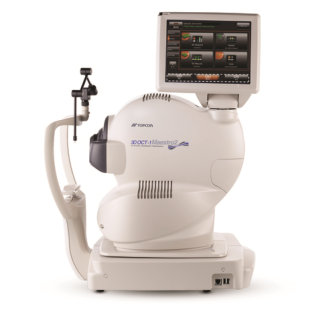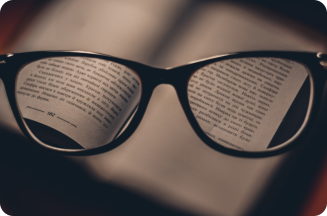Many people take their vision for granted - even some who wear glasses or contact lenses. Our vision
impacts on all aspects of life; our work, leisure, sport - all require adequate vision. Access to information
through reading, television, computers and mobile devices all depend upon clear vision. Life itself can
depend on the ability to see properly while driving, or walking in busy towns and cities. Despite this, a
significant proportion of people do not even have regular eye examinations. The RNIB recommend a sight
test every 2 years if you have no vision problems, or more frequently if you do. In fact, RNIB statistics show
that every year, 12.5 million people who need to, do not have a regular eye test.
Part of the reason is that eyes, unlike teeth, don't normally let you know when something is wrong. Often,
because sight deterioration can be very gradual, people genuinely don't notice that they are not seeing as well as they could. Regular examinations are
important as the sooner a vision problem is detected, the greater the chance of successful treatment - this is particularly true with young children and the
elderly. Our state-of-the-art 3D OCT system enables us to see deep into the tissues of the eye, enabling early diagnosis of many potentially serious conditions.
More information about this quick, painless process is available by clicking here.
Although wanting the best vision is a major reason why people choose to have regular examinations, the eye
examination can reveal so much more; a number of underlying health problems such as high blood pressure
or diabetes for example. Of course there are a number of eye complaints and diseases that we regularly
detect, monitor and arrange treatment for; cataracts, glaucoma and macular diseases being the most
prevalent. OCT scans enable earlier detection of many of these and other conditions – in some cases many
years before other tests reveal them. It is a sobering thought that every week we refer a number of patients
for medical assessment of various problems.
All eye examinations are carried out by one of our optometrists and last between 20 to 30 minutes for the
main examination. Further procedures or further investigation can add a further 20 - 40 minutes to your
visit, depending upon exact requirements, and can be arranged for a future date. Your optometrist will ask
about your current visual needs or requirements as well as your general medical history, medication, and
any relevant family history of eye problems. Your eyes will then be examined both internally and externally. This will enable an assessment to be made of the
general health of your eyes and identify any other underlying medical problems. There are many other tests including those for glaucoma, colour vision
problems, eye movement, co-ordination, muscle effectiveness... the list could go on! Measurements will be
taken of your vision when you are not wearing spectacles or contact lenses to assess the extent of any
visual error. If the examination shows that you could benefit from vision correction, then you will be
shown the difference between your current vision and the improvement that can be made. At the end of
the test your optometrist will write your prescription for you.
The care does not end there however; next you will be introduced to your dispensing optician who can
advise on the most suitable lenses and frames for your needs. Unlike many high-street 'opticians', GOC
registered fully qualified dispensing opticians are on hand with specialised knowledge of spectacle lens
design and availability. They will be able to guide you through the many lens and frame options, and offer any advice you may need, or answer any questions
you might have about the examination, eye health, spectacle lenses, contact lenses and frames.
Many people take their vision for granted - even some who wear
glasses or contact lenses. Our vision impacts on all aspects of
life; our work, leisure, sport - all require adequate vision. Access
to information through
reading, television, computers
and mobile devices all depend
upon clear vision. Life itself
can depend on the ability to
see properly while driving, or
walking in busy towns and
cities. Despite this, a significant proportion of people do not even
have regular eye examinations. The RNIB recommend a sight test
every 2 years if you have no vision problems, or more frequently
if you do. In fact, RNIB statistics show that every year, 12.5
million people who need to, do not have a regular eye test.
Part of the reason is that eyes, unlike teeth, don't normally let you
know when something is wrong. Often, because sight
deterioration can be very gradual, people genuinely don't notice
that they are not seeing as well as they could. Regular
examinations are important as the sooner a vision problem is
detected, the greater the chance of successful treatment - this is
particularly true with young
children and the elderly. Our
state-of-the-art 3D OCT
system enables us to see
deep into the tissues of the
eye, enabling early diagnosis
of many potentially serious
conditions. More information
about this quick, painless
process is available by clicking here.
Although wanting the best vision is a major reason why people
choose to have regular examinations, the eye examination can
reveal so much more; a number of underlying health problems
such as high blood pressure or diabetes for example. Of course
there are a number of eye complaints and diseases that we
regularly detect, monitor and arrange treatment for; cataracts,
glaucoma and macular diseases being the most prevalent. OCT
scans enable earlier detection of many of these and other
conditions – in some cases many years before other tests reveal
them. It is a sobering thought that every week we refer a number
of patients for medical assessment of various problems.
All eye examinations are carried out by one of our optometrists
and last between 20 to 30 minutes for the main examination.
Further procedures or further investigation can add a further 20 -
40 minutes to your visit, depending upon exact requirements,
and can be arranged for a future date. Your optometrist will ask
about your current visual needs or requirements as well as your
general medical history, medication, and any relevant family
history of eye problems. Your eyes will then be examined both
internally and externally. This
will enable an assessment to
be made of the general health
of your eyes and identify any
other underlying medical
problems. There are many
other tests including those for
glaucoma, colour vision problems, eye movement, co-ordination,
muscle effectiveness... the list could go on! Measurements will be
taken of your vision when you are not wearing spectacles or
contact lenses to assess the extent of any visual error. If the
examination shows that you could benefit from vision correction,
then you will be shown the difference between your current
vision and the improvement that can be made. At the end of the
test your optometrist will write your prescription for you.
The care does not end there however; next you will be introduced
to your dispensing optician who can advise on the most suitable
lenses and frames for your needs. Unlike many high-street
'opticians', GOC registered fully qualified dispensing opticians are
on hand with specialised knowledge of spectacle lens design and
availability. They will be able to guide you through the many lens
and frame options, and offer any advice you may need, or answer
any questions you might have about the examination, eye health,
spectacle lenses, contact lenses and frames.























